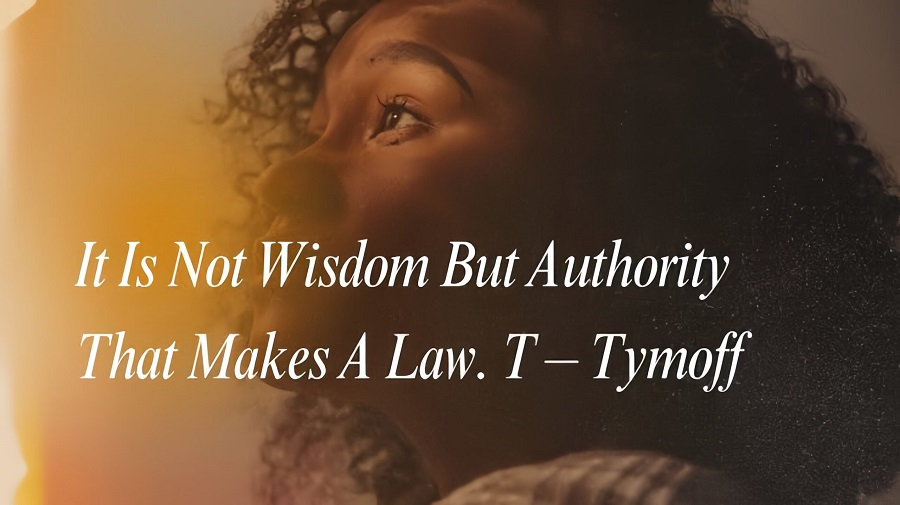It is not wisdom but authority that makes a law
It is not wisdom but authority that makes a law provocative statement, often attributed to Thomas Hobbes, invites a critical examination of the philosophical underpinnings of legal systems.
At the heart of this debate lies a complex interplay between reason, morality, and political authority. On one hand, wisdom implies a deep comprehension of human nature, society, and the consequences of actions. Laws derived from wisdom would ideally promote justice, harmony, and the common good. On the other hand, authority represents the capacity to enforce rules, irrespective of their underlying rationale. Laws based on authority alone risk being arbitrary, oppressive, and devoid of ethical considerations.

In this exploration, we will delve into the historical and philosophical context of this statement, analyze the strengths and weaknesses of both wisdom-based and authority-based legal systems, and examine real-world examples to illustrate the complexities of this issue. Ultimately, we seek to understand whether a balance between wisdom and authority is essential for creating just and effective laws.
Authority in Lawmaking
Authority in lawmaking refers to the legitimate power and role that individuals or institutions possess to create, amend, and enforce laws. This authority is essential for maintaining order, establishing societal norms, and ensuring that legal rules are applied consistently. Understanding the nature and scope of authority in lawmaking helps clarify how laws are developed and implemented within a society.
Sources of Authority
Constitutional Authority
In many democracies, the ultimate source of authority is derived from a constitution or foundational legal document. This constitution outlines the structure of government and grants specific powers to various branches and levels of government. For instance, in the United States, the Constitution grants legislative authority to Congress, the executive authority to the President, and the judicial authority to the Supreme Court.
Legislative Bodies
Legislative authority is typically vested in elected representatives who form legislative bodies such as parliaments, congresses, or assemblies. These bodies are responsible for drafting, debating, and passing laws. Their authority is derived from the mandate given by the electorate through elections.
Executive Authority
In some systems, executives (e.g., presidents, prime ministers) have the authority to propose laws, issue executive orders, or veto legislation. This authority allows them to influence the lawmaking process and ensure that laws align with the executive’s policy agenda.
Judicial Authority
Judicial authorities interpret laws and ensure they are applied correctly. While they do not make laws, their interpretations can influence the application and development of legal principles. In some cases, courts can strike down laws that are deemed unconstitutional, effectively shaping the legal landscape.
Mechanisms of Authority
Lawmaking Processes
Lawmaking processes are structured to ensure that authority is exercised transparently and responsibly. These processes typically involve multiple stages, including drafting, debate, revision, and voting. For example, in many parliamentary systems, proposed laws (bills) must pass through several readings and committees before becoming law.
Enforcement and Implementation
Once laws are enacted, their enforcement falls under the purview of various governmental agencies and institutions. These agencies are empowered by law to ensure compliance, administer regulations, and address violations. Enforcement mechanisms are crucial for the practical application of laws and maintaining public order.
Checks and Balances
To prevent the abuse of authority, many legal systems incorporate checks and balances. These mechanisms ensure that no single branch of government becomes too powerful. For instance, in the U.S. system, Congress can pass laws, but the President can veto them, and the Supreme Court can review their constitutionality.
Challenges and Considerations
Abuse of Authority
One of the primary challenges in lawmaking is the potential for abuse of authority. When those in power use their authority to benefit themselves or a specific group, it can lead to corruption, unjust laws, and erosion of public trust. Effective oversight and accountability mechanisms are essential to mitigate this risk.
Balancing Authority and Representation
In democratic systems, there is an ongoing challenge to balance the authority of elected representatives with the need for broad representation and public input. Ensuring that the authority exercised in lawmaking reflects the diverse interests and needs of the population is a critical aspect of a just legal system.
Adaptability and Reform
As societies evolve, the authority in lawmaking must adapt to new challenges and changes. This adaptability requires lawmakers to be responsive to emerging issues and willing to reform outdated or ineffective laws.
Authority in lawmaking is fundamental to the creation and maintenance of legal systems. By understanding its sources, mechanisms, and associated challenges, we gain insight into how laws are shaped and how they impact society.
Where can I apply this in my life?
Understanding authority in lawmaking can have practical applications in various aspects of your life, from personal decision-making to professional development and civic engagement. Here’s how you might apply this knowledge:
Civic Engagement and Advocacy
Informed Voting:
Understanding how authority in lawmaking works can help you make informed decisions when voting. Knowing the roles and powers of elected officials and how they influence legislation can guide you in choosing candidates who align with your values and priorities.
Participating in Public Discourse:
You can use your understanding of lawmaking authority to engage in meaningful public discussions and advocacy. Whether you’re participating in town hall meetings, writing to your representatives, or joining community organizations, knowing how laws are made and enforced will help you advocate effectively for changes you want to see.
Career Development
Legal and Policy Careers:
If you’re pursuing a career in law, public policy, or government, understanding the nuances of authority in lawmaking is crucial. This knowledge will help you navigate the legislative process, understand the role of different stakeholders, and contribute to shaping effective policies and laws.
Organizational Leadership:
For those in managerial or leadership roles within organizations, understanding how laws and regulations impact your industry can aid in compliance and strategic planning. It can also help in shaping organizational policies that align with legal requirements and best practices.
Personal Decision-Making
Compliance and Rights:
Being aware of how laws are made and enforced can help you better understand your rights and obligations. This awareness is useful in everyday situations, such as when dealing with contracts, employment issues, or personal disputes.
Critical Thinking:
Applying knowledge of lawmaking authority encourages critical thinking about how laws affect your life and community. It can help you evaluate the fairness and effectiveness of laws and regulations and consider how they could be improved.
Community Involvement
Volunteering and Advocacy:
Understanding how authority is exercised in lawmaking can empower you to get involved in community advocacy efforts. Whether you’re volunteering with non-profits, participating in local governance, or working on social justice issues, this knowledge will help you contribute effectively.
Local Governance:
Engaging with local government bodies or committees can be more impactful if you understand their authority and decision-making processes. You can contribute to local initiatives, provide informed feedback, and work collaboratively with officials to address community needs.
Educational Pursuits
Academic Studies:
If you’re studying political science, law, or public administration, grasping the concept of authority in lawmaking is fundamental. It will enhance your understanding of how legal systems function and prepare you for advanced research or professional practice.
Lifelong Learning:
Even outside formal education, exploring how laws are made and enforced enriches your general knowledge and critical thinking skills. It helps you stay informed about current events and understand the broader implications of legal decisions on society.
Incorporating an understanding of authority in lawmaking into various areas of your life can empower you to make informed decisions, engage effectively with societal issues, and contribute meaningfully to your community.
Authority vs. Wisdom
Authority vs. Wisdom is a fundamental distinction in the realms of governance, decision-making, and personal leadership. While both are essential in guiding actions and policies, they represent different aspects of influence and judgment. Here’s a detailed comparison to elucidate their roles and interplay:
Definitions
Authority:
- Definition: Authority refers to the power or right to give orders, make decisions, and enforce obedience. It is typically institutionalized and granted through legal or organizational structures.
- Source: Authority is derived from formal positions or roles, such as elected officials, judges, or organizational leaders. It often comes with specific responsibilities and the ability to compel compliance.
Wisdom:
- Definition: Wisdom is the quality of having experience, knowledge, and good judgment. It involves the ability to make sound decisions based on deep understanding and insight.
- Source: Wisdom is more personal and experiential. It is gained through life experiences, reflection, and learning. Unlike authority, it is not necessarily tied to a formal position or role.
Characteristics
Authority:
- Formal: Authority is often associated with a specific role or title that grants the power to make decisions and enforce rules.
- Enforcement: It involves the ability to impose rules and compel adherence through formal mechanisms, such as laws, regulations, or organizational policies.
- Responsibility: Authority comes with the responsibility to act within the boundaries of the law or organizational guidelines and to be accountable for the decisions made.
Wisdom:
- Informal: Wisdom is more informal and less tied to a specific role or position. It is often recognized through actions, advice, and the ability to provide valuable guidance.
- Guidance: Wisdom involves offering advice and perspectives based on experience and understanding, rather than enforcing rules.
- Adaptability: Wisdom is adaptable and context-sensitive, often requiring nuanced judgment and the ability to foresee long-term consequences.
- Application
Authority:
- Decision-Making: Authority is crucial in making and implementing decisions, especially in structured environments like governments, businesses, and legal systems.
- Leadership: Leaders with authority have the power to direct and influence others, set goals, and manage resources.
- Governance: In governance, authority ensures the implementation of laws and policies and maintains order and structure.
Wisdom:
- Advisory Role: Wisdom plays a key role in advising and guiding decisions, often providing insight into complex or ambiguous situations.
- Problem-Solving: Wise individuals can offer solutions that consider long-term impacts and broader perspectives, often finding creative or unconventional approaches to challenges.
- Ethical Guidance: Wisdom helps in navigating ethical dilemmas and making decisions that align with values and principles.
Interplay and Balance
Potential Conflicts:
- Misuse of Authority: Authority without wisdom can lead to decisions that are rigid, short-sighted, or unjust. For example, strict enforcement of laws without considering their impacts can lead to negative outcomes.
- Lack of Authority: Wisdom without authority might result in valuable insights and advice being overlooked or ignored, as there may be no power to implement recommended changes.
Achieving Balance:
- Integrating Wisdom: Leaders and decision-makers should strive to integrate wisdom into their authoritative roles. This involves listening to diverse perspectives, considering long-term effects, and making informed choices.
- Empowering Wisdom: Organizations and governments can create structures that empower wise individuals to influence decision-making processes, even if they do not hold formal authority.
Examples
Historical Figures:
- Authority: Figures like George Washington and Margaret Thatcher held formal authority and used it to lead and implement policies.
- Wisdom: Philosophers like Socrates and Confucius are examples of individuals whose wisdom has guided ethical thinking and personal conduct.
Modern Contexts:
- Authority: CEOs, government officials, and judges wield authority in their respective roles, shaping policies and enforcing rules.
- Wisdom: Advisors, mentors, and thought leaders contribute wisdom by offering insights and guidance based on experience and reflection
Conclusion
“It is not wisdom but authority that makes a law.” The interplay between authority and wisdom is fundamental to the creation and implementation of law. While authority is the force that enacts and enforces laws, wisdom is the guiding light that shapes their content and application.
A legal system that is solely based on authority risks becoming arbitrary, oppressive, and unjust. Conversely, a system driven solely by wisdom without the power to enforce laws would be ineffectual.
Therefore, a harmonious balance between authority and wisdom is essential for creating a just and equitable legal order. This balance requires individuals in positions of authority to cultivate wisdom, and for societies to develop mechanisms to hold authority accountable to higher principles.
By recognizing the interconnectedness of authority and wisdom, we can work towards building legal systems that truly serve the public good.


